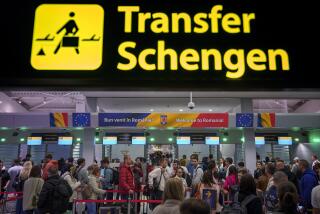Russia, 5 Others Agree to Revive ‘Ruble Zone’
- Share via
MOSCOW — Bucking a tide of economic independence, five former Soviet republics agreed Tuesday to work toward a currency union with Russia that would restore the ruble as the coin of the realm.
The accord signed by Russia, Armenia, Belarus, Kazakhstan, Tajikistan and Uzbekistan calls for a new “ruble zone” to replace the one that collapsed July 26.
Although it sharpened the divide between those intent on re-integrating with Moscow and those eager to go their own way, Russian officials hailed the accord as a step toward reasserting their grip over the former empire. They emphasized that outsiders are still free to sign up.
“Starting today, we are turning a new page in our development,” Russian Prime Minister Viktor S. Chernomyrdin said. “This is a big step toward an economic union.”
Since the Soviet Union split into 15 nations in 1991, each has created its own central bank and nine have abandoned the Russian ruble, embracing new currencies as symbols of political and monetary freedom from Moscow.
The creation of those currencies sped the dramatic breakdown in trade among new nations that are still in many ways more closely tied than the European Community. The flow of fuel and raw materials was disrupted, driving down living standards all over the region.
What remained of the old ruble zone became increasingly unworkable. As the countries still using the ruble bought goods from Russia, they simply printed new bank notes to pay for them; the resulting inflation spread across the entire zone, costing Russia billions of dollars in what amounted to trade subsidies.
Russia’s Central Bank put an end to all that July 26 by invalidating trillions of pre-1993 rubles, effectively abolishing the ruble as a common currency.
Under Tuesday’s accord, Russia’s five partners in the new ruble zone will accept the Russian Central Bank as their sole supplier of national currency. The agreement will take effect only after they have adopted credit, customs and budget policies in harmony with Moscow’s.
“Economic integration will be carried out in a civilized manner and not the way it used to be when Russia was a donor without any limitations, as if we were the richest country in the world,” Russian Finance Minister Boris G. Fyodorov said.
Uzbekistan announced that it would be ready to join the new ruble zone within two weeks, but the others were expected to take as long as several months. In the interim, they will be allowed to issue their own currencies or use pre-1993 rubles no longer good in Russia.
Russia’s neighbors face conflicting pressures to move closer to, or away from, cooperation with Moscow. The International Monetary Fund now requires former Soviet republics to have an independent currency before lending them money.
On the other hand, Russia offers cheap oil and natural gas for rubles and often cuts off energy supplies to non-ruble neighbors that fall behind in their payments.
Russian officials expressed some skepticism Tuesday that the new currency union will succeed. For one thing, Russia’s legislature is trying to bust President Boris N. Yeltsin’s proposed budget with hyper-inflationary credits to failing industries. For another, they said, Russia’s neighbors might not be sincere.
“If they seek to get quick credit, or another three shipments of oil (from Russia) before joining some Asian bloc, then clearly this is not going to work,” Fyodorov told reporters. “The transitional period will provide the acid test of (identifying) those who really want to develop the market with Russia and those who want short-term dividends.”
The finance minister spelled out the advantages for each side: Ruble nations will enjoy freer trade with Moscow and avoid alienating skilled ethnic Russian workers, who might return to their homeland if the ruble is abandoned.
Russia needs a ruble zone, he said, because it cannot afford to set up customs posts on all its borders and because many of its factories “simply cannot survive if they don’t have additional markets. . . . Russia doesn’t need so many harvester combines as it produces (but) we cannot throw them onto the Western market because these goods are not competitive.”
More to Read
Sign up for Essential California
The most important California stories and recommendations in your inbox every morning.
You may occasionally receive promotional content from the Los Angeles Times.













